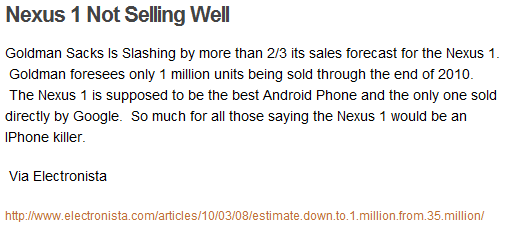NEXUS “Not Selling Well” — Really?
I caught in Twitter today a “retweet” from @MacsFuture where they said that the Nexus 1 isn’t selling well. There was a link to the full comment on posterous, where the author writes:
I wanted to tackle this for a minute.[1. Â Don’t worry, I am not going to tackle the whole “iPhone Killer” meme again. Â It’s played out. Â But remember, when people use that phrase more often than not they mean more than simply “give it a run for it’s money.” Â They usually mean “drive to obscurity.” And rarely do we see a product enter and compete in an existing space and drive out a competitor]Â Â I would have to agree that the NEXUS is not selling as well as, well, most other smart phones on the market right now, but on the other hand let’s balance the assessment by pointing out a couple things contained in the short post above.
1.  The forecast anticipates selling 1 million units by the end of 2010.  This is actually quite a  significant figure for a phone that really only works best (for now) with T-Mobile.
2. Â The Nexus is only “sold directly by Google.” Â In fact, let’s be more pointed with this: it’s only sold by Google, through an online purchase. Â Imagine if the only way to get an iPhone was through the Apple Store site. Â Would they still have sold millions? Yes, undoubtedly, but one cannot discount the tremendous boost Apple received by having their products in the hands of thousands of people nationwide, simultaneously. Â Not to mention the tremendous press coverage of the “long lines waiting to get their hands on their first iPhone” that we saw in every news media market.
Now, a million units sold in 1 year is relatively trivial compared to the numbers of even the iPhone 1st generation phone. Â That said, consider the deck that Google has elected to stack against itself.
T-Mobile is a good and worthy network, so I am told.  But more often than not, people talk about it as if it is the little sibling of the  “big 3” when people talk about their cell-carriers.  I think I can count on one hand (without resorting to binary)  the number of friends and colleagues that use T-Mobile.  Selling a million units for a phone that is, out of the box, tied to a company with http://en.wikipedia.org/wiki/T-Mobile_USA is “not too shabby.”  (This compares right now with AT&T having approximately 85 million wireless customers.)  Given the large numbers of people who are locked in to their existing contracts, I don’t see many people switching carriers, especially since they are not afforded the opportunity to “try before they buy.”  (See next point)
Additionally, the decision by Google to only sell the Nexus online, through their website, has to hamstring their sales.  I may like tech, but when it comes to dropping $500 or more on a phone (and/or getting a long term contract) I want to be able to touch it first, see how it feels and responds in my hands, and feel like I was an informed consumer when  I make  my decision.  I suspect I am not alone.  More than once I have driven past our local T-Mobile store thinking that, if only they had a Nexus in the store, I would stop and at least test the waters.  I suspect that, if I could go in to a T-Mobile and not only play with the phone a bit, but talk with them about the affordability of switching from AT&T to T-Mobile, I would make the switch.  And again, I suspect I am not alone.
Finally, early reports of lack-luster customer support by Google has most likely scared off a number of would-be consumers.  Take away the store front/salesperson access, and market your phone on a network that would require me to switch carriers, and I am going to want, nay expect, a rather significant online and “on phone” support structure.  Unfortunately, Google has grown a culture based around offering “free” and “Beta” services.  Expectations of support for “free” services are far lower than expectations when one spends a significant amount of cash.
And make no mistake–$500 is significant.
In the final (as of today) analysis, I would say that 1 million units sold is actually a remarkable number given that Google has left the confines of their “core competency” (which I will describe as creating free and innovative software-based experiences) and ventured in to the world of offering “for sale” hardware products.[2. True, Google has relied on HTC for the design and manufacturing of the Nexus leveraging their core competency, but they have not been a retailer.]Â Â Additionally, they seem to be wanting to “play by the rules” of traditional retailing instead of breaking new ground in the cellphone industry (as was speculated prior to the offering of the Nexus).
What does the future really hold for the Nexus line? Â It is now a waiting game, I suppose. Â Imagine Google addressing even 1 of the issues above. An expansion to another network (such as a Verizon or AT&T) or even the opening of sales at T-Mobile stores could make a significant difference for the phone. Â Or, perhaps they utimately will rewrite the rules for cell-phones, offering free phones to those that actively use Google services, extending the Ad Revenue model to a whole new domain.
Considering the mis-steps one can only conclude that the Nexus succeeds, despite itself.
